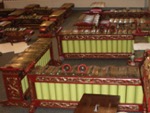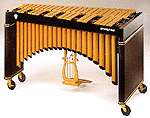The bars of the instrument are struck by mallets of varying hardnesses. The vibraphone looks similar to a xylophone and a marimba. The difference is that the bars of both the xylophone and marimba are made of wood. In general terms, the xylophone is a soprano or high register marimba (the difference being in the tuning and timbre). The bars of a vibraphone are made of metal. The vibraphone also has a sustain pedal like a piano that when depressed allows the notes to ring until the pedal is lifted again. The vibraphone originally got its name because it has a motor that turns metal discs, called pulsators, located under the bars at the openings of the resonators or tubes. The rotation of the pulsators gives a "vibrato" (more accurately tremolo) sound to the instrument. Without this motor the vibraphone could just as easily be called a metalophone because of it's metal bars.
Mike Freeman
Vibraphone Special Effects:
Bending notes on the vibraphone
Developed by Gary Burton in the early 70’s
Audio examples:
(After Listening use the back arrow to return here)
1. Vibe Bend
2. Vibe Bend2
3. Vibe Bend Music
4. Vibe Wah Wah
Bowing the vibraphone:
Done by bowing the end of a bar, similar in effect to rubbing your finger on the edge of a wine glass.
Mouth and hand vibrato (tremolo)
Done by opening and closing your mouth directly over a bar that is ringing or pulsating your hand up and down over a bar.
Marimba Special Effects:
The use of special mallets such as mallets rapped in cellophane.
![]()



